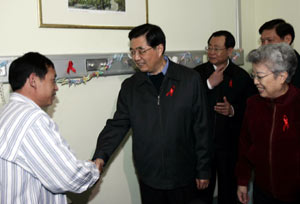
Chinese President Hu Jintao (2nd, L) shakes hands
with an AIDS patient in a Beijing hospital on Nov. 30, 2004.-- Xinhua
On the eve of the World AIDS Day, Chinese President Hu Jintao shook hands
with AIDS patients in a Beijing hospital Tuesday afternoon, giving a mighty push
to the country's intensified battle against the killer disease.
"Both the government and society will truly care about you and help you in an
all-out manner. I hope you will further enhance your confidence and courage to
combat and overcome the disease," Hu told the AIDS patients while shaking hands
with them at BeijingYou'an Hospital.
During his one-hour stay at the hospital, Hu, wearing a red silk ribbon
symbolizing love and care on his chest, visited two AIDS wards and reached out
for handshakes with the patients insideas soon as he entered the rooms. When he
left, he shook hands withthe patients again and wished them an early recovery.
The AIDS patients, who looked a bit nervous at the very beginning, eased up
when a smiling Hu started chatting with them face-to-face, and told the
president about their treatment and family conditions in details.
"After my handshake with the president, I feel AIDS is no longer so terrible,
and I'm convinced that AIDS patients can also lead a life as normal as that of
all others," said one patient whoasked to be identified only by his surname Wei.
A pig raiser in north China's Shanxi Province, 40-year-old Wei tested HIV
positiveseven years ago.
Hu's move, which came one year after Premier Wen Jiabao's landmark handshake
with three hospitalized AIDS patients in Beijing on last year's World AIDS Day,
gave a clear and strong signal that the top leadership's is committed to curb
the spread of AIDS and dispel social discrimination against HIV/AIDS victims.
"We're thrilled by the Chinese president so clearly showing to all the
provinces, cities, counties and officials that we need to deal with HIV/AIDS,"
said Henk Bekedam, representative of the World Health Organization (WHO) in
China, after learning the news.
"Political commitment is very necessary and the handshaking gives a signal to
leaders at all levels of the country," he added."We are excited and happy to see
it happen in China."
Ken Legins, HIV/AIDS project officer with the UNICEF Office forChina, also
hailed (the Chinese leaders') "examples to (other) leaders in the world in AIDS
prevention."
Following Premier Wen's highly-acclaimed handshake last December, AIDS
prevention and the welfare of HIV/AIDS victims, once a largely-neglected and
even taboo topic for many Chinese officials, has attracted much attention from
both central and local governments.
The latest statistics showed that China's central budget for AIDS control and
prevention had soared to 390 million yuan (47 million US dollars) in 2003 from a
mere 15 million yuan (1.8 million dollars) in 2001. The increased fund was used
in newly-launched government projects that provide free HIV/AIDS test for
citizens, free treatment for poor HIV carriers and AIDS patients, as well as
clean syringes and drug substitutes for drug addicts.
In Henan Province, where farmers in dozens of villages contracted HIV/AIDS in
groups as a result of contaminated blood selling, provincial officials were
dispatched to live in those so-called "AIDS villages" and help villagers get
timely treatment andassistance.
Reflecting heightened public awareness of the AIDS menace, hugebillboards on
AIDS prevention were erected last week in Sanlitun, the famous "bar street" or
night life haunt for local youngsters and foreigners in the Chinese capital
Beijing, while an increasingnumber of Chinese universities and colleges opened
their campus tosex education, AIDS lectures and free condom distribution.
"The social environment for the HIV/AIDS victims is turning forthe better, as
we are seeing less discrimination from the general public," said Li Xiang, 28,
an HIV carrier who initiated the Beijing-based Mangrove Support Group Project to
provide care and support for people like him.
A three-day small exhibition featuring artistic works by HIV/AIDS victims
attracted more than 300 visitors in Beijing earlier this month, and some
visitors even expressed the wish to buy and take back home the paintings by HIV
carriers.
Nevertheless, the Chinese president conceded that the country "is still
facing a grave situation" in AIDS control and prevention when he met with local
medical workers and volunteers engaged in the fight against AIDS Tuesday at
You'an Hospital.
China, which reported its first AIDS case in 1985, now has an estimated
840,000 HIV carriers and AIDS patients. But United Nations health officials
warned this week that the disease was spreading from traditionally "high-risk
groups," such as sex workers, drug users and male having sex with male, to the
"generalpopulation" in this country of 1.3 billion.
Both the Communist Party of China and the whole society "need to make further
efforts" to effectively curb the spread of HIV/AIDS, Hu, also general secretary
of the Party Central Committee, gave the call during the meeting with the
hospital staff and volunteers.
Also on Tuesday, 100,000 "textbooks on AIDS control and prevention" specially
compiled for Party and government officials were distributed to all 31
provinces, autonomous regions and municipalities across the country.
"I think President Hu's move will make leading officials of Party committees
and governments at all levels fully realize theirresponsibility in AIDS control
and prevention," said Zhao Pengfei,WHO's AIDS project officer in China.



